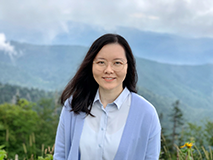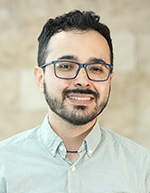Several doctoral students in the ACE department are completing their studies soon and starting to search for their next professional adventures. We want to highlight their research and show you a glimpse of how much energy, effort, and support they bring to our group. This month we share profiles of two such students: Chang Cai and Noé Nava.
 Chang Cai, Ph.D. in Agricultural and Applied Economics
Chang Cai, Ph.D. in Agricultural and Applied Economics
My research interests focus on issues related to parks, outdoor recreation, and adaptation to climate change and extreme events. I’m currently working to understand how tourists perceive and respond to raging wildfires and thick smoke in national parks. My research frequently explores the use of interesting geospatial data and leverages the tools of causal inference and machine learning. Beyond academia, I am an avid hiker.
What work are you most proud of from your time at UIUC?
“On the Evaluation of Heterogeneous Climate Change Impacts on US Agriculture: Does Group Membership Matter?" (published in Climatic Change)
I studied the impact of wildfires on recreation demand in western national parks. I'm particularly proud of it because I developed this idea from scratch based on my personal experience and observations, and this is what I always wanted to do. I received a huge amount of guidance at UIUC and took this project to the next level.
Why did you get into the type of work you do?
A driving force of my works is my passion to understand the human-nature relationship. I grew up in a small mountain city in China where environmental alternations have become a big issue. My childhood hiking experience with my father shaped my love for the outdoors and introduced me to see the value of the natural environment. While exploring the American West, I was intrigued by the adaptive resilience of tourists to forest fires.
What do you hope happens as a result of your work (eventually)?
I hope a better understanding of the visitation effects of wildfires could help enhance local efforts to better inform the public about the role of fires in parks and increase proactive fire planning in combating the damaging impact of wildfire on national park gateway communities, as the climate warms.
What will you do (or are you hoping to do) next?
I'm looking forward to applying my research skills in a non-profit or research institute position where I can continue to conduct research and pursue new questions that increase our understanding of interactions between people and nature and addresses the urgent challenge of climate change
Chang's faculty advisor is Dr. Benjamin Gramig. Connect: www.chang-cai.com | @simiziCee
 Noé Nava, Ph.D. in Agricultural and Applied Economics
Noé Nava, Ph.D. in Agricultural and Applied Economics
I am interested in studying Food Systems and their implications for the environment and health with a focus on the NAFTA (now USMCA) region. I strive to study empirical issues from a structural modeling approach to inform public policy. I work with large datasets of climatological, land use, and economic indicators regarding U.S. farmers’ lands. I am also experienced in the estimation of price and income elasticities using censored AIDS and QUAIDS, counterfactual simulations using general equilibrium models of trade, and input-output structural decomposition analyses with regional and multi-regional databases.
What work are you most proud of from your time at UIUC?
My proudest achievement is my second-year paper, "A model of the U.S. food system: What are the determinants of the state vulnerabilities to production shocks and supply chain disruptions?" It was awarded The Charles M. Tiebout Prize in Regional Science 2021 and Most Outstanding Second-year Paper from the U.S. Department of Agriculture. But most importantly, the model I developed in my second-year paper has been applied to study the real-world implications on food insecurity in the U.S. from the disruptions in the Suez Canal early this year, and it can also be further manipulated to study a large array of policy-relevant questions.
Why did you get into the type of work you do?
I believe that economics works should be flexible enough to study a large array of counterfactuals that allows policy makers to improve our food system. Mathematical models allow me to provide normative conclusions about the existing food system by tweaking their parameters to find the conditions that improve the conditions of the existing food system.
What do you hope happens as a result of your work (eventually)?
I hope that one of my mathematical models becomes a standard tool for economists interested in food systems in the U.S.
What will you do (or are you hoping to do) next?
I am looking forward to finding a place that houses this idea of developing a comprehensive yet simple model of the U.S. food system with the intention to apply it to study food insecurity and farmers’ welfare in the U.S.
Noé's faculty advisor is Dr. William Ridley. Connect: noejn2.github.io/ | @normalEconomist
